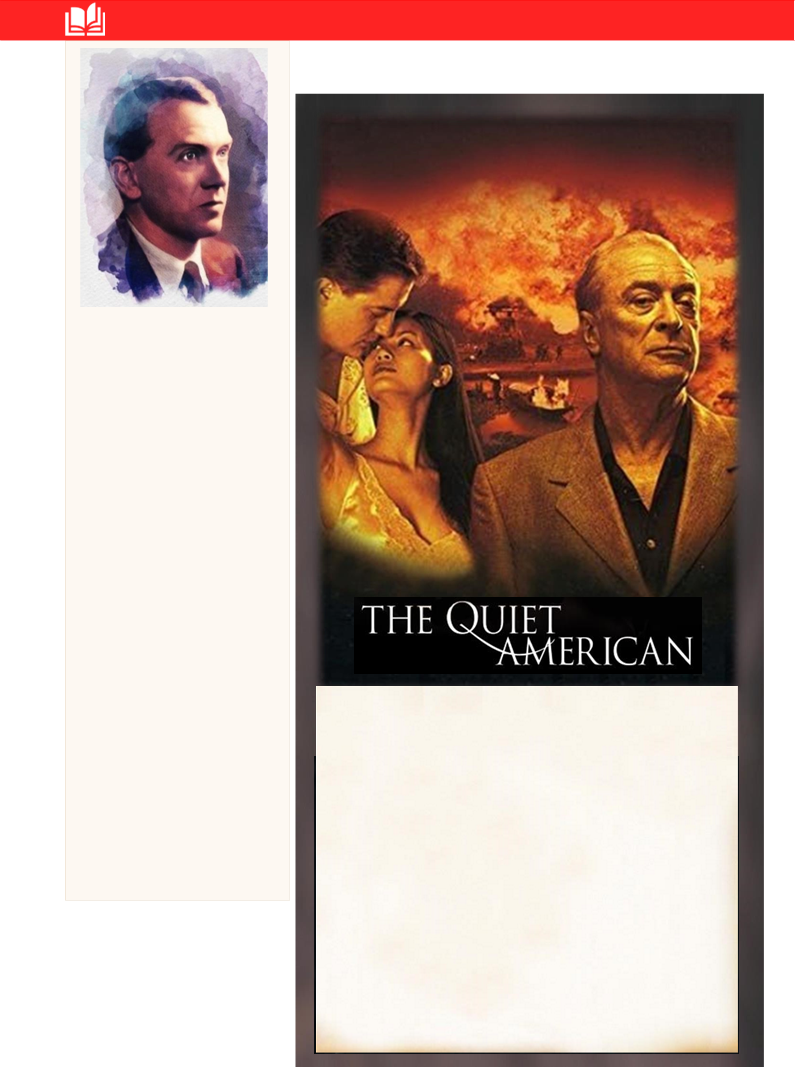Робочий аркуш (a worksheet): "The Quiet American by Graham Greene"
English Literature
THE QUIET AMERICAN by Graham Greene
ABOUT THE AUTHOR
Graham Greene (1904—1991) is a British author. After studying at the University of Oxford, he converted to Roman Catholicism in 1926 . Beginning c. 1930, he worked principally as a freelance journalist for several decades, during which he travelled widely.
the writings of Graham Greene. He observed Theology has a more explicit impact on the theme of the misery of man without God and wrote: ‘the religious sense was lost to the English n ovel, and with the religious sense went the sense of the importance of the human act. It was as if the world of fiction had lost a dimension....’ For him, the characters of Virginia Woolf drift ‘like cardboard symbols through a world that is paper -thin’. Greene was a journalist, a film critic, an Intelligence officer and a traveller, and usually set his fictions in farfault -lines: Vienna, Mexico, Liberia, Cuba. All -off theatres on political are written with chameleon skill, keeping to the rules of the genre and taking on the colouring of the place, though the place is never a good place. Greene writes sparely with a firm narrative line.
Greene’s first success was his fourth novel,
Stamboul Train (1932), later classified as an
‘entertainment’ as distinct from his more serious novels. Some prefer the unintellectual entertainments, which make good films. But his distinctiveness rests on his ‘Catholic’ novels, from Brighton Rock (1938) to A Burnt-Out Case (1961), which rest on a theology of the gamble, carried to unorthodox extremes.
Since good--andand--wrong (for divine grace evil is a more important axis than right trumps human morality), a (Catholic) sinner who sacrifices himself to redeem another may be saved, even if the rules say that he should lose his soul. This ‘good’ Faustian bargain is seen at its simplest in his unconvincing play The Potting Shed (1958) and at its best in The Power and the Glory (1940) and The Heart of the Matter (1948).
During his lifetime, Greene was honored by Queen Elizabeth II, but never won a Nobel
Prize despite several nominations by colleagues.
|
TASK A. Read the text about the author and answer the questions:
1. What were the professional interests of Graham Greene? Name the fields in which he had a professional experience.
2. While Greene didn't like to be labeled as a religious person, what religion definitely influenced a majority of his works?
3. Graham Greene wrote two different types of works. What are they? Name three of each type.
|
TASK B. Read the text about the story and answer the following questions:
1. In what war is the story set?
a) First Indochina War (1946—1954) c) Second Indochina War (1964—1973)
b) Third Indochina War (1977—1973) d) Second World War (1939—1945)
2. Why did Miss Hei want her sister Phuong to leave Fowler for Pyle?
3. What did the sites want in the love triangle and the political triangle in the novel?
ABOUT THE STORY
 The Quiet American is a novel by Graham Greene that is set in Vietnam in the early 1950s. The story takes place in the midst of the conflict between the Viet Minh and the South Vietnamese, who are supported by the French. It tells the story of a jaded English reporter Thomas Fowler, who has been living in Saigon for an extended period of time, an idealistic American diplomat Alden Pyle, who works for the Economic Aid Mission, and an inscrutable Vietnamese dancer Phuong who likes to go to the cinema. Or, to put it differently, it is about a man who writes reluctantly, another man who reads too eagerly, and a woman who apparently does not read or write at all, but who is also unreadable. The novel begins with Pyle's death, but the circumstances of his murder are unknown until the novel's final chapter. Vigot, a French policeman, initially suspects Fowler in Pyle's demise, but he adamantly denies the charge. From there, the novel goes into a series of flashbacks that illustrate the erratic history between Pyle and Fowler. Soon after Pyle's arrival in Saigon, he falls in love with Phuong, Fowler's Vietnamese lover. Pyle decides that he wants to woo Phuong away from Fowler, who cannot marry her because he has a wife at home in London. Their love triangle has many twists and turns, but the climax of the novel occurs when Fowler finds out that Pyle is involved in deadly espionage with the hopes of establishing the guerrilla General Thé as an American-backed Third Force in the war. Pyle believes that the death of Vietnamese civilians is necessary to further the cause of ‘democracy’, but Fowler is disgusted by Pyle's overly simplified point of view. The narrative unfolds in a non-linear fashion, allowing Greene to build up the suspense surrounding the question that forms the novel's core: Did Thomas Fowler have anything to do with the death of Alden Pyle? In the final chapter of The Quiet American, Fowler finally reveals — to the reader, not to any of the other characters — that he assisted a Communist leader in assassinating Pyle after finding out that Pyle was involved in the bombing of a public square.
The Quiet American is a novel by Graham Greene that is set in Vietnam in the early 1950s. The story takes place in the midst of the conflict between the Viet Minh and the South Vietnamese, who are supported by the French. It tells the story of a jaded English reporter Thomas Fowler, who has been living in Saigon for an extended period of time, an idealistic American diplomat Alden Pyle, who works for the Economic Aid Mission, and an inscrutable Vietnamese dancer Phuong who likes to go to the cinema. Or, to put it differently, it is about a man who writes reluctantly, another man who reads too eagerly, and a woman who apparently does not read or write at all, but who is also unreadable. The novel begins with Pyle's death, but the circumstances of his murder are unknown until the novel's final chapter. Vigot, a French policeman, initially suspects Fowler in Pyle's demise, but he adamantly denies the charge. From there, the novel goes into a series of flashbacks that illustrate the erratic history between Pyle and Fowler. Soon after Pyle's arrival in Saigon, he falls in love with Phuong, Fowler's Vietnamese lover. Pyle decides that he wants to woo Phuong away from Fowler, who cannot marry her because he has a wife at home in London. Their love triangle has many twists and turns, but the climax of the novel occurs when Fowler finds out that Pyle is involved in deadly espionage with the hopes of establishing the guerrilla General Thé as an American-backed Third Force in the war. Pyle believes that the death of Vietnamese civilians is necessary to further the cause of ‘democracy’, but Fowler is disgusted by Pyle's overly simplified point of view. The narrative unfolds in a non-linear fashion, allowing Greene to build up the suspense surrounding the question that forms the novel's core: Did Thomas Fowler have anything to do with the death of Alden Pyle? In the final chapter of The Quiet American, Fowler finally reveals — to the reader, not to any of the other characters — that he assisted a Communist leader in assassinating Pyle after finding out that Pyle was involved in the bombing of a public square.
TASK C. Read the book analysis and answer
the following questions:
1. Who is York Harding?
2. Pyle believes in York Harding’s Third Force.What is the ideology of the Third Force?
a) colonialism c) theocracy
b) democracy d) communism
3 . What causes Pyle’s death?
a) He was poisoned.
c) He was shot in the chest.b) He was drowned in mud.
d) He was stabbed in the back.
TASK D. Read the extract from Chapter 1
and answer the questions by choosing an option:
1 . Why was the American ‘quiet’?
a) He was shy. c) He was hiding himself.
b) He was dead. d) He was a spy.
2. Did Fowler kill Pyle?
a) Yes, with his own hands.
b) No, but he is an accomplice.c) No, he is innocent.
d) Yes, but it was an accident.
3. What is the characteristic of Pyle given by
Fowler? Did he like him? What for?
ANALYZING THE NOVEL
 Greene’s novel The Quiet American was actually more philosophical than political, nonetheless entailing a strong and pointedly anti-American political message. It focuses on the moral dilemma of Thomas Fowler, the British reporter from whose point of view the story is told. This dilemma traps him into making a life or death choice: should he cooperate with the Vietnamese Communists who want to assassinate the American CIA agent Alden Pyle, or should he refuse to do so, and thereby remain neutral and disengaged? Fowler’s predicament is comfeelings toward Pyle, the idealistic Harvard graduate, whom he personally likes. Pyle plicated by his hopes to transform Vietnam in accordance with the political theories of his intellectual hero ‘York Harding’, a fictional though plausible American diplomatic correspondent who, Fowler contemptuously notes, had once spent a week in Vietnam. Pyle enthusiastically buys into York Harding’s proposal that the US government back a
Greene’s novel The Quiet American was actually more philosophical than political, nonetheless entailing a strong and pointedly anti-American political message. It focuses on the moral dilemma of Thomas Fowler, the British reporter from whose point of view the story is told. This dilemma traps him into making a life or death choice: should he cooperate with the Vietnamese Communists who want to assassinate the American CIA agent Alden Pyle, or should he refuse to do so, and thereby remain neutral and disengaged? Fowler’s predicament is comfeelings toward Pyle, the idealistic Harvard graduate, whom he personally likes. Pyle plicated by his hopes to transform Vietnam in accordance with the political theories of his intellectual hero ‘York Harding’, a fictional though plausible American diplomatic correspondent who, Fowler contemptuously notes, had once spent a week in Vietnam. Pyle enthusiastically buys into York Harding’s proposal that the US government back a
‘Third Force’, neither Communist nor French colonialists, and use this ‘Third Force’ to establish a ‘national democracy’ in Vietnam.
Complicating things is the romantic interest Pyle has in Phuong, Fowler’s beautiful young Vietnamese girlfriend. The background to this dilemma is the political situation in Vietnam in the early 1950s, a time when the French are in decline and the
American presence is growing. Greene wrote The Quiet American just as the US started promoting South Vietnam’s Ngo Dinh Diem as a kind of ‘Third Force’ noncommunist leader with anti-French credentials. His novel, by pinpointing some of
the fatal weaknesses in American policy, showed remarkable prescience; its insightful description of these weak points has contributed significantly to its enduring popularity. According to Greene (as recounted through Fowler’s words), the American policy was deeply flawed because it wasn’t based on a thorough understanding of the lives of ordinary Vietnamese, it unrealistically depended on the Vietnamese peasants’ embracing of Western-style democracy, and it was pursued through reliance on morally reprehensible local leaders. It was, in other words, a combination of ridiculously naïve and brutally cynical impulses. The quiet American, Alden Pyle, personified these qualities.
When Pyle is killed by Communist agents, Fowler, in an outburst to an American official, says: ‘They killed him because he was too innocent to live. He was young and ignorant and silly and he got involved. He had no more of a notion than any of you what the whole affair’s about and you gave him money and York Harding’s books on the East’ and said, ‘Go ahead. Win the East for Democracy.’ This portrayal of Pyle
Americanreflects Fowler’s (and, to a degree, Greene’s) idea of America. In fact, is downright prickly with critical barbs against not only American foreign The Quiet policy, but against American culture in general. Because of these somewhat snide comments, the book has, from its first appearance, drawn a great deal of negative attention in the US. In one internal tirade, Fowler expresses this view of the Americans in Saigon: I was tired of the whole pack of them with their private stores of Coca-Cola
and their portable hospitals and their too wide cars and their not quite latest guns.
And again, in reference to a reporter from Pittsburgh, ‘He was like an emblematic statue of all I thought I hated in America — as ill-designed as the Statue of Liberty and as meaningless’. The use of the phrase ‘all I thought I hated’ as well as Fowler’s admission a few lines later that he had been too hasty in his judgment of the American reporter suggest that Greene didn’t take all of these sentiments to heart, though it’s clear from the work as a whole that he was deeply suspicious of American policy in Vietnam and had misgivings about American culture in general.
Chapter 1 part 1:
[Vigot, a French inspector, speaking to Fowler]
<…> ‘What do you know about Pyle? Please answer my questions, Monsieur Fowler. I don’t want to ask them. But this is serious. Please believe me it is very serious.’
‘I’m not an informer. You know all I can tell you about Pyle. Age thirty-two, employed in the Economic Aid Mission, nationality American.’
‘You sound like a friend of his,’ Vigot said, looking past me at Phuong. A native policeman came in with three cups of black coffee. ‘Or would you rather have tea?’ Vigot asked.
‘I am a friend,’ I said. ‘Why not? I shall be going home one day, won’t I? I can’t take her with me. She’ll be all right with him. It’s a reasonable arrangement. And he’s going to marry her, he says. He might, you know. He’s a good chap in his way. Serious. Not one of those noisy bastards at the Continental. A quiet American,’ I summed him precisely up as I might have said, ‘a blue lizard,’ ‘a white elephant.’
Vigot said, ‘Yes.’ He seemed to be looking for words on his desk with which to convey his meaning as precisely as I had done. ‘A very quiet American.’ He sat there in the little hot office waiting for one of us to speak. A mosquito droned to the attack and I watched Phuong. Opium makes you quick-witted — perhaps only because it calms the nerves and stills the emotions. Nothing, not even death, seems so important. Phuong, I thought, had not caught his tone, melancholy and final, and her English was very bad. While she sat there on the hard office-chair, she was still waiting patiently for Pyle. I had at that moment given up waiting, and I could see Vigot taking those two facts in.
‘How did you meet him first?’ Vigot asked me. Why should I explain to him that it was Pyle who had met me? I had seen him last September coming across the square towards the bar of the Continental: an unmistakably young and unused face flung at us like a dart. With his gangly legs and his crew-cut and his wide campus gaze he seemed incapable of harm. The tables on the street were most of them full. ‘Do you mind?’ he had asked with serious courtesy. ‘My name’s Pyle. I’m new here,’ and he had folded himself around a chair and ordered a beer. Then he looked quickly up into the hard noon glare. ‘Was that a grenade?’ he asked with excitement and hope.
‘Most likely the exhaust of a car,’ I said, and was suddenly sorry for his disappointment. One forgets so quickly one’s own youth: once I was interested myself in what for want of a better term they call news. But grenades had staled on me; they were something listed on the back page of the local paper — so many last night in Saigon, so many in Cholon: they never made the European press. Up the street came the lovely flat figures — the white silk trousers, the long tight jackets in pink and mauve patterns slit up the thigh. I watched them with the nostalgia I knew I would feel when I had left these regions forever. ‘They are lovely, aren’t they?’ I said over my beer, and Pyle cast them a cursory glance as they went up the rue Catinat.
‘Oh, sure,’ he said indifferently: he was a serious type. ‘The Minister’s very concerned about these grenades. It would be very awkward, he says, if there was an incident — with one of us, I mean.’
‘With one of you? Yes, I suppose that would be serious. Congress wouldn’t like it.’ Why does one want to tease the innocent? Perhaps only ten days ago he had been walking back across the Common in Boston, his arms full of the books he had been reading in advance on the Far East and the problems of China. He didn’t even hear what I said; he was absorbed already in the dilemmas of Democracy and the responsibilities of the West; he was determined — I learnt that very soon — to do good, not to any individual person but to a country, a continent, a world. Well, he was in his element now with the whole universe to improve.
‘Is he in the mortuary?’ I asked Vigot.
‘How did you know he was dead?’ It was a foolish policeman’s question, unworthy of the man who read Pascal, unworthy also of the man who so strangely loved his wife. You cannot love without intuition.


про публікацію авторської розробки
Додати розробку
